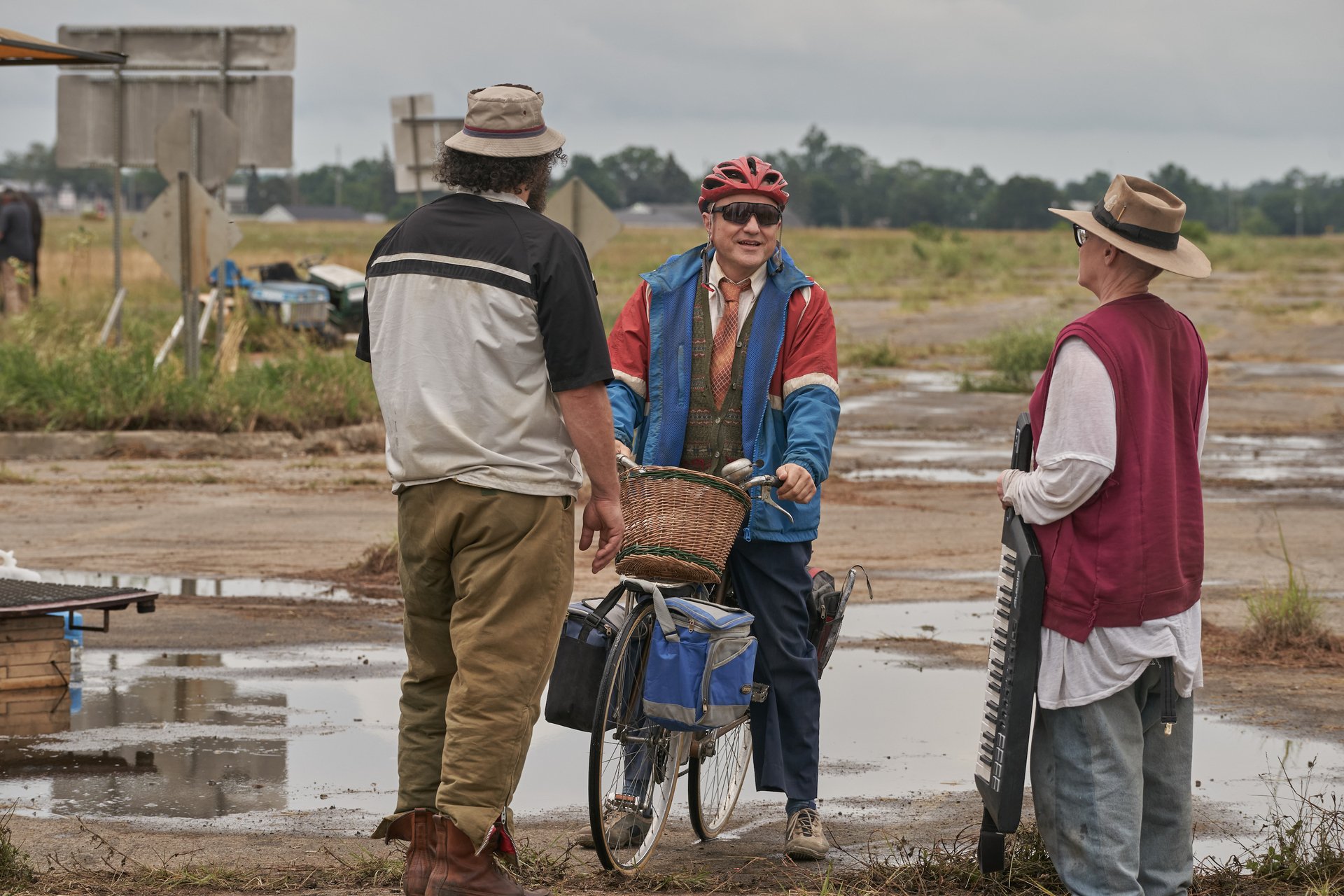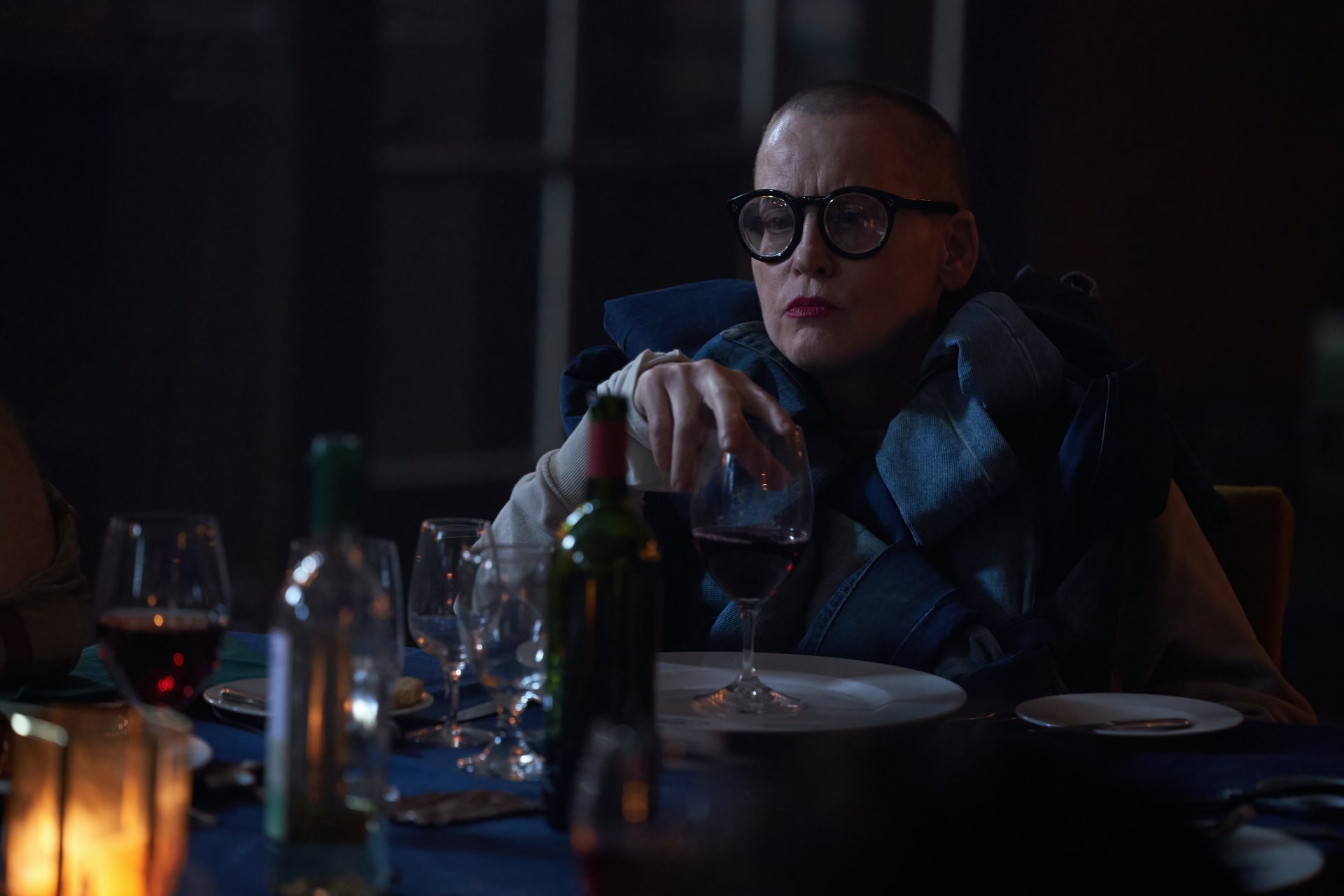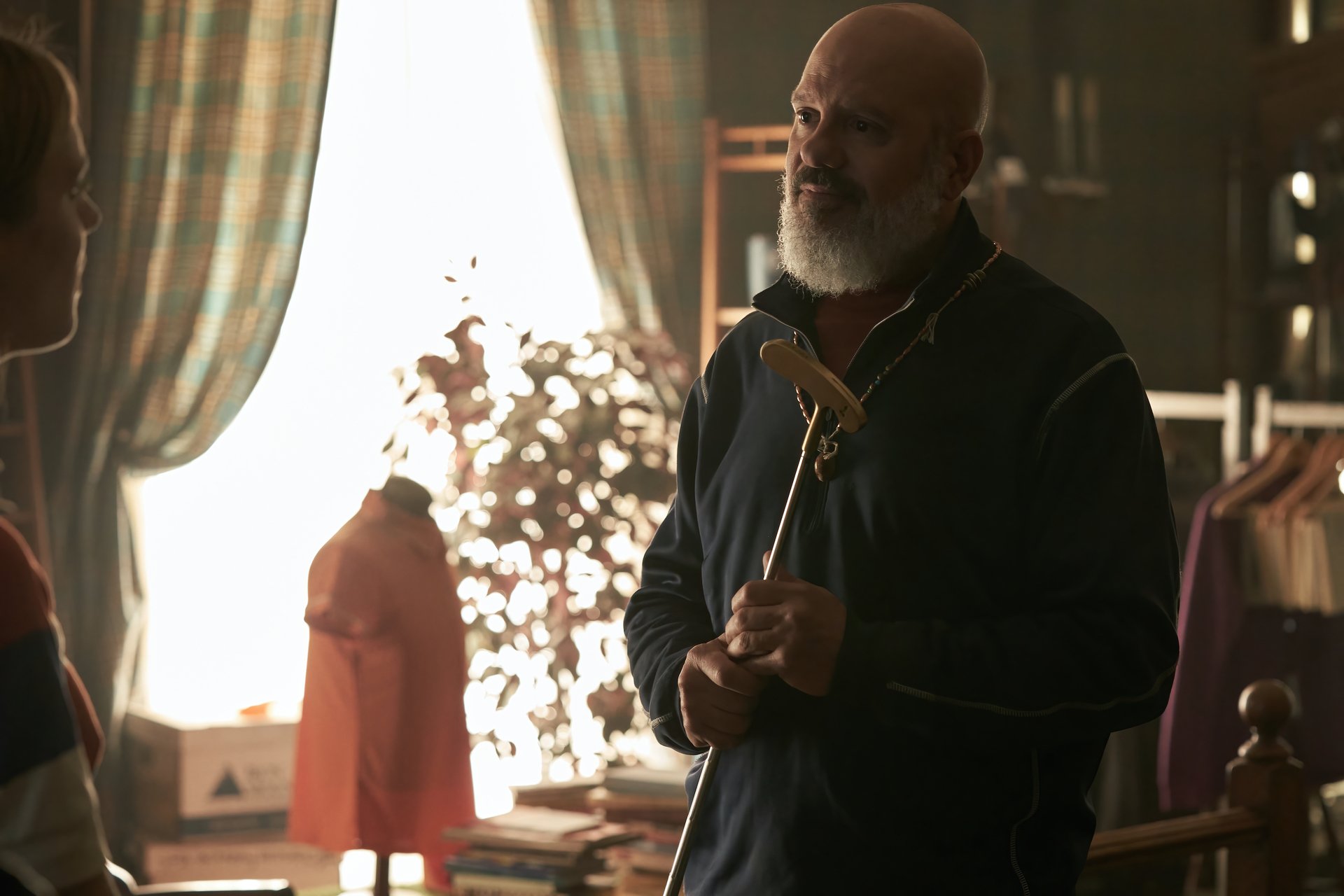[Review/Recap with Joe Lipsett] Station Eleven Continues to Impress with Episodes 4 and 5
Each week, Joe and Terry review an episode of HBO Max’s dystopian drama Station Eleven, alternating between our respective sites — queerhorrormovies.com and gaylydreadful.com.
Spoilers for episodes 4 and 5, “Rosencrantz and Guildenstern Aren’t Dead” and “The Severn City Airport.”
“Rosencrantz and Guildenstern Aren’t Dead”
TERRY
The first thing I noticed in “Rosencrantz and Guildenstern Aren’t Dead” is something I’ve noticed from the very beginning and keep forgetting to mention, Joe. It’s the absolute banger of a score by composer Dan Romer that’s often mixed beautifully and perfectly with the editing (this episode courtesy of Anna Hauger and Yoni Reiss) and cinematography by Daniel Grant. Romer has gifted us with fantastic scores in the past, from Beasts of the Southern Wild and Beasts of No Nation to Luca and...er...Dear Evan Hansen.
Well, they can’t always be good.
But Station Eleven’s music is so intrinsic to its visual aspects, which also ties into the show’s themes about the importance of art and music in a post apocalyptic world. The opening shot of episode 4 shows a person trudging through deep snow, intercut with someone walking through tunnels and another through the streets of Chicago, the music just ominously building in the background while the repeated refrain of “I remember damage” percolating behind it all.
Even when Station Eleven isn’t doing anything, it’s still an audiovisual feast for the senses.
Which leads me to the second thing I noticed about this particular episode: it feels slight and, when contrasted with last week’s “Hurricane,” reminded me that I don’t particularly care about these 2040 characters. Maybe it’s because the narrative just drops us into the midst of the Traveling Symphony after giving us so much time to relate to Young Kirsten (Matilda Lawler), Jeevan (Himesh Patel) and Miranda (Danielle Deadwyler).
Station Eleven has given us episodes devoted to this trio of characters and they have the most thematic depth and emotional connection for me. The Traveling Symphony, meanwhile, has struggled to even give me names for some of the characters and leaves me scrambling to catch up before it drops new ones on us.
This episode, the new characters come with a whole lot of baggage. First, we get the return of Brian (Enrico Colantoni), the emissary introduced in “A Hawk from a Handsaw”, begging the troupe to make a stop at the Museum of Civilization. His perennially creepy smile suggests that the troupe will eventually make its way there and it won’t be a great stop. He leaves, rebuked, with the promise of seeing them at their next stop, Huevos Santiago.
It’s also here that newly recruited Dan (Dylan Taylor) gets to act as the audience’s cipher to understand the politics of the group. He asks why the troupe doesn’t go to the town of Pingtree and we learn that the former director of the troupe Gil (David Cross) and Conductor Sarah (Lori Petty) had a falling out about the direction of the troupe and Gil left, with new lover Katrina (Sarah Orenstein), to Pingtree.
But Kirsten (Mackenzie Davis) is still reeling from her interaction with the Prophet (Daniel Zovatto) and the knowledge he seemingly has about her graphic novel Station Eleven. She believes there’s only one copy and no way the Prophet could know its story, since she hid the comic at Pingtree. With Alex (Philippine Velge) acting somewhat obtuse and shady after her own talk with the Prophet, Kirsten decides she needs to get to the bottom of whatever his deal is.
Awkward family reunions occur between Gil, Katrina and the actors ensue.
Minefields must be crossed.
A random and off-the-cuff performance of Hamlet is produced on the spot when Sarah feels threatened by Gil’s cockiness.
Kirsten finds herself in the same predicament that Jeevan did, only the roles are reversed, when it comes to parenting Alex. I was honestly ready to write the episode mostly off as a necessary plot point, however dull I found it, until the explosive ending.
It leaves me in a weird predicament, Joe. Because I think a lot of the plot points of the episode are important and set up specific conflicts as the miniseries moves into its middle half, but I missed the more character-based episodes (“Wheel of Fire” and “A Hawk From a Handsaw,” to be specific). This episode didn’t widen the world or deepen my understanding of it, two things the aforementioned episodes did exceedingly well.
Maybe this episode is like composer Romer and Dear Evan Hansen...they can’t all be good (though it does give us a fantastic line, as Kirsten tells Katrina, “we are artists...we’re terrified”)
I could be coming down a bit hard on “Rosencrantz and Guildenstern Aren’t Dead,” so I’ll turn it over to you, Joe. What were your overall thoughts about the episode and David Cross’s cameo as Gil? And while I tiptoed around the ending, I want to know your reaction to the kids, and the mines. What do you make of the flashbacks with Jeevan and Young Kirsten at the house and the way the episode contrasted their conflict with the conflict with Alex in 2040?
JOE
I’m in full agreement with you about the combined strength of the visuals, the editing and the score. It’s particularly fantastic at generating tension in that stunning climax: as Conductor Sarah wails away on the piano, we cross-cut between her, Kirsten - chasing one runaway child with mines strapped to their body - and Cross’ Gil, who is coaxing another. As Joe Pingue’s Dieter inadvertently steps on Sarah’s glasses , the two children crush Gil in an explosive hug that kills him and knocks Kirsten off her feet. The final image, which may not even be in the same timeframe (Station Eleven likes to mess with our perception of time), sees a bloody Kirsten calling for Alex, who has fled Pingtree on horseback, presumably to meet up with the Prophet.
While I agree that this episode is nowhere near as sophisticated as the last, Terry, I do think you’re being a little hard on it. The 2040 characters are a bit of a shapeless mass still, but the further we get into the series, the less I think it matters. The focus here is very explicitly on Kirsten’s shift in roles from child to parent, as evidenced by the cross-cutting between Year One at the cabin and Pingtree.
I actually think that there’s a lot going on in this episode. You mention Kirsten’s great line, but it’s actually the second time/variation we hear. The first is at the uncomfortable reunion meal when Sarah and Dieter verbally spar with Gil, who accuses them of being resistant to change, prompting the conductor to retort: “We’re artists. Everything we do is dangerous.”
The difference between dangerous and terrified is a thin line in this world and seemingly divides people by age: Alex runs down the hill through the minefield to hug Gil with the same carefree attitude as the stolen children execute their suicide mission (meanwhile older cautious members of the group nearly have a heart attack). Alex and young Kirsten both accuse their caregivers of being afraid to charge, a visual that’s visually reinforced when we see the literal wheel depicting the geographical circle that the Symphony never leaves. Even within the pages of the graphic novel itself, it seems as though the divide is between the older Captain and the younger survivors who wish to use time travel to escape their fate.
But there’s also safety in staying on the prescribed path. Had Kirsten not allowed Alex to bait her into going to Pingtree to check on the comic, could they have avoided death and disaster? Had young Kirsten not made a fuss about retrieving the Station Eleven comic at night, would Javeen have been there in the morning?
It’s significant that the Prophet stole all of the children from Pingtree and that Alex is drawing with crayons at the kids table when Katrina suggests the Prophet would only be compelling “if you’re young enough.” It’s unclear if the mysterious adversary believes his own lines about “there is no before” and that the “Post-pen” (ie: post-pandemic) generation are the first to be “rid of trauma”, but it is clear that history is a now subject of controversy. It’s one thing for Kirsten and Alex to swap roles (as Kirsten has done with Jeevan), but it’s quite another to rewrite Hamlet using the vernacular of 90s indie rock. Even the concept of a CD and a camcorder is subject to derision in this new world.
All of this obsession with history lost and remade, plus the episodic reminder that there’s a Museum of Civilization just a week away? It’s fated, Terry!
“The Severn City Airport”
Considering your feelings about the intimacy of character-focused episodes set in the past, Terry, I’m especially curious to read your thoughts on “The Severn City City Airport”, which finds Clark (David Wilmot), Elizabeth (Caitlin FitzGerald) and Tyler (Julian Obradors) her pre-teen son with Arthur, stranded for 100 days in an abandoned airport in the aftermath of the flu outbreak.
This is a fascinating episode - it focuses on characters, but not ones we felt a great deal of affinity or even connection to from previous episodes. It will, I think, also test the patience of some viewers as they come to realize that every single important person and event of note from 2040 is clearly tied to one another here - particularly in the episode’s final moments as we realize that Clark may have inadvertently begun the Museum of Civilization with his collection of 21st century artefacts and the tortured boy threatening the sanctuary of this newfound community is, in fact, the boy who would grow up to become the Prophet.
I personally am not bothered by this coincidence. Station Eleven has been playing with circles and connections throughout its run (the Wheel, the flashbacks, even the recurring motif of the comic itself), so it makes sense that these people just so happen to inexplicably be the most important people in the world and were scattered around the globe just as it began to fall apart. There’s something poetic about that, but it’s understandable if that’s a step too far for some viewers.
While “The Severn City Airport” doesn’t offer the same emotional highs as “Hurricane”, the episode’s fascination with the dissolution and evolution of a society, and the theatricality of leadership is informative for the world to come in 2040. Clark, as Elizabeth says at one point, struggles to get people to pay attention to anything he says, but during the apocalypse, he becomes the leader of the ragtag group because he understands how to use situational factors, such as the abandoned security card, to his advantage.
It’s deeply ironic that Clark is able to use the abscondment of night-custodian-turned-Homeland-Security-impersonator Jerry Mercer and his harem of Florida-bound women into a leadership platform, because Clark’s methods are just as fake. He, Elizabeth and former security guard Miles (Milton Barnes) put on a show as convincing as any the Travelling Symphony have done to create a shared lie and unite the crowd (“Fuck Jerry Mercer!”). And it works; despite the fact that their qualifications as a glorified spin doctor, actress and airport security guard hardly warrant it, this move guarantees their place at the top of the decision-making tree.
What’s even more fascinating is how Tyler clearly internalized these duplicitous moves, but also grew to harbour resentment. It’s two-pronged: not only do they fail to value the life of an immune survivor from the infected plane, but Tyler’s compassion turns him into a threat that leaves him and his mother ostracized. No wonder he grew up to hate this generation.
But Terry, I want to know your take on these developments. How did you receive the fall and rise of civilization over these 100 days and did this episode work better for you? Did you enjoy spending a dedicated chunk of time on previously tertiary characters like Clark and Elizabeth? Were you surprised to see Enrico Colantoni’s Brian was Elizabeth’s agent and, most importantly, is the wig supposed to look as terrible as it does?
TERRY
Until you mentioned it, Joe, I had absolutely no idea that Enrico Colantoni was in this. After seeing your comment, I had to go back and look to prove to myself that you weren’t pulling my leg. I think most people’s Colantoni point of reference would be Veronica Mars but I never really got into that show so, for me, we’d have to go back to the 1997-2003 sitcom Just Shoot Me! And boy that wig did no favors for the man.
Bad wigs aside, I’m kind of split down the middle with this episode, Joe.
Regardless of how I feel about the somewhat vaguely characterized and frequently nameless characters in 2040 (and the lack of time we’ve spent with them--seriously, of the five episodes we’ve only spent two in 2040!!), Station Eleven is smart in the way it splits its time between the many different time periods. While covering Genera+ion (RIP, you beautiful show), we wondered if the narratives were structured in accordance with the episode release schedule. And I’m wondering the same in regards to the way Station Eleven is being released because the narrative works in relation to its own release schedule. So we got a huge and literally explosive cliffhanger in the last episode and the show denies us any sort of closure with its followup. In essence, we’re still stuck on the cliffhanger and will be for another week.
It also answers some of our questions...but in the roundabout way Station Eleven operates in. Initially? Lump me in the group you mentioned who will probably have their patience tested because I sat there thinking, “of all the characters you want to fill in history with, why is it Clark, a character who seemingly has no other role in the story?” But the answer to that question is that “The Severn City Airport” isn’t Clark’s story. It’s, as you mentioned, The Prophet’s story.
The way Station Eleven allows that particular story to unfold is so measured and decisive in its pacing that I can’t really fault it. You’re absolutely right, episode 5 does not have the same emotional resonance that “Hurricane” did. But it has so much narrative weight behind it because it not only gives us answers to The Prophet’s insistence that “There’s no Before” as well as gives us an understanding of why he is the way he is, it also gives us a tantalizing first look at what will eventually become the Museum of Civilization.
I’m glad you brought up the way Station Eleven explores leadership and art because all I kept thinking about when Clark and Co. created a narrative to get the airport crew together was William Shakespeare. The bard has been incredibly important to the overarching narrative, as it began with Shakespeare and continues in 2040 with his plays in the Traveling Symphony. And the quote that kept ringing in my ears while I listened to them tell a story to bring the disparate people together was “All the world’s a stage, / And all the men and women merely players; / They have their exits and their entrances; / And one man in his time plays many parts.”
While this monologue is never expressly stated, it does seem to hit at the heart of Station Eleven’s narrative process. The idea that we’re all actors in the play of life holds resonance in a story that’s about the healing power of art and the way in which life imitates art which imitates life. Acting is of particular significance, from Arthur’s attempts to be a “serious” actor and not a blockbuster one to the Traveling Symphony’s acting troupe to the way Clark takes on the role of leader.
Shakespeare’s “every person plays many parts” monologue similarly applies to Kirsten’s changing role from terrified child to adult who feels maternal towards Alex. We’ve seen that with the many faces of Arthur as we saw various parts of his adult life. And we have now seen it with Tyler/The Prophet. Likewise on a more structural level, “they have their exits and their entrances” perfectly encapsulates the way Station Eleven’s narrative unspools itself, introducing characters who enter and exit as needed or when the story dictates them. I might be thinking too deeply into it but with a story so focused on Shakespeare, it’s hard to ignore one of his most famous lines.
One of the moments that worked best for me, though, was when Clark “calls” Arthur on the walkie talkie to walk through his emotional state and his fears. He tells Clark that he tried to do what’s right for Tyler, but that he feels he failed. Tyler’s very much like his father, “But he’s a destroyer. And you were never a destroyer.” And that ominous line is reinforced by Tyler destroying the plane that once carried diseased passengers, before slipping into the darkness.
And it’s that line, more than anything else, that tells us that, nameless or not, the people in 2040 are in deep trouble. Maybe we’ll discover more when we go back to QueerHorrorMovies for Episodes 6 and 7.
Station Eleven airs multiple episodes each Thursday on HBO Max.


![[Review/Recap with Joe Lipsett] Station Eleven Continues to Impress with Episodes 4 and 5](https://images.squarespace-cdn.com/content/v1/5b39608d75f9eef54c62c3f0/1640276877568-KCJFO2GSVTGNGIB21LHF/mackenzie-davis.jpg)











![[Review/Recap with Joe Lipsett] The Glitter Bandit is (Maybe) Unmasked in Yellowjackets' Explosive "Flight of the Bumblebee"](https://images.squarespace-cdn.com/content/v1/5b39608d75f9eef54c62c3f0/1641178560407-QU6G4I8QDWIBBGIVAN1U/Yellowjackets_108_SG_0061_R.jpg)
![[Review/Recap with Joe Lipsett] Yellowjackets "Saints" Gets Wilder and More Supernaturally Sinister](https://images.squarespace-cdn.com/content/v1/5b39608d75f9eef54c62c3f0/1639955279208-NBGQ71OYQMZJPAGS4RG5/Yellowjackets_106_1788_R.jpg)
![[Search Party Review w/ Joe Lipsett] Episodes 4-6 Continues the Bleak Psychological Horror Streak](https://images.squarespace-cdn.com/content/v1/5b39608d75f9eef54c62c3f0/1611180083043-FN5B1C9B3B7LZU14R2AA/search-party_0%281%29.jpg)
![[Genera+ion Review with Joe Lipsett] Episodes 4 and 5 Are At Their Best When They Focus On The Teens](https://images.squarespace-cdn.com/content/v1/5b39608d75f9eef54c62c3f0/1616079209183-P2K82SFZMH74BP0P5N5E/haley-sanchez.jpg)
![[Review/Recap with Joe Lipsett] Station Eleven Focuses on the Damage and Loss in Episodes 8 & 9](https://images.squarespace-cdn.com/content/v1/5b39608d75f9eef54c62c3f0/1641395709881-LH2N9E6XBHCAP8BSXASG/david-wilmot_1.jpg)